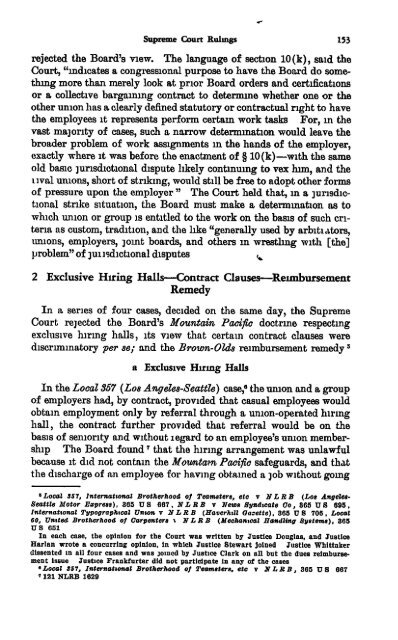TWENTY-SIXTH ANNUAL REPORT - National Labor Relations Board
TWENTY-SIXTH ANNUAL REPORT - National Labor Relations Board
TWENTY-SIXTH ANNUAL REPORT - National Labor Relations Board
You also want an ePaper? Increase the reach of your titles
YUMPU automatically turns print PDFs into web optimized ePapers that Google loves.
Supreme Court Rulings 153<br />
rejected the <strong>Board</strong>'s view. The language of section 10(k), said the<br />
Court, "indicates a congressional purpose to have the <strong>Board</strong> do something<br />
more than merely look at prior <strong>Board</strong> orders and certifications<br />
or a collective bargaining contract to determine whether one or the<br />
other union has a clearly defined statutory or contractual right to have<br />
the employees it represents perform certam work tasks For, in the<br />
vast majority of cases, such a narrow determmation would leave the<br />
broader problem of work assignments in the hands of the employer,<br />
exactly where it was before the enactment of § 10(k)—with the same<br />
old basic jurisdictional dispute likely continuing to vex him, and the<br />
iival unions, short of striking, would still be free to adopt other forms<br />
of pressure upon the employer" The Court held that, in a jurisdictional<br />
strike situation, the <strong>Board</strong> must make a determination as to<br />
which union or group is entitled to the work on the basis of such criteria<br />
as custom, tradition, and the like "generally used by arbitiators,<br />
unions, employers, joint boards, and others in wrestling with [the]<br />
problem" of jui isdictional disputes<br />
2 Exclusive Hiring Halls—Contract Clauses—Reimbursement<br />
Remedy<br />
In a series of four cases, decided on the same day, the Supreme<br />
Court rejected the <strong>Board</strong>'s Mountain Pacific doctrine respecting<br />
exclusive hiring halls, its view that certain contract clauses were<br />
discriminatory per se; and the Brown-Olds reimbursement remedy 3<br />
a Exclusive Hiring Halls<br />
In the Local 357 (Los Angeles-Seattle) case,e the union and a group<br />
of employers had, by contract, provided that casual employees would<br />
obtain employment only by referral through a union-operated hiring<br />
hail, the contract further provided that referral would be on the<br />
basis of seniority and without legard to an employee's union membership<br />
The <strong>Board</strong> found that the hiring arrangement was unlawful<br />
because it did not contain the Mountam Pacific safeguards, and that<br />
the discharge of an employee for having obtained a job without going<br />
5 Local 357, International Brotherhood of Teamsters, etc v NLRB (Los Angeles-<br />
Seattle Motor Express), 385 U5 687, NLRB v News Syndicate Co, 865 US 695,<br />
International Typographical Union v NLRB (Haverhill Gazette), 365 1:7 S 705, Local<br />
60, United Brotherhood of Carpenters NLRB (Mechanical Handling Systems), 865<br />
S 651<br />
In each case, the opinion for the Court was written by Justice Douglas, and Justice<br />
Harlan wrote a concurring opinion, in which Justice Stewart joined Justice Whittaker<br />
dissented in all four cases and was joined by Justice Clark on all but the dues reimbursement<br />
issue Justice Frankfurter did not participate In any of the cases<br />
e Local 857, International Brotherhood of Teamsters, etc v NLRB, 365 U S 667<br />
121 NLRB 1629

















